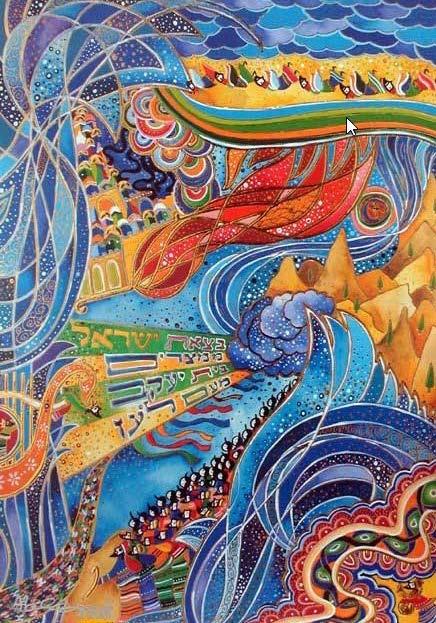
15 minute read
Divine Revelation
from HaSofrim: May 2020
by AUJS
Zachary Gomo
Shavuot is the celebration of the anniversary of the receipt of the Torah.
Advertisement
It is when the Jewish people remember the original divine revelation at Mount Sinai, on an annual basis. This event is central to the Jewish understanding of the world. Indeed, it is inseparable from any other claim or belief that Judaism has to make.
The eighth principle of the great Medieval Rabbi Moses Maimonides’s thirteen principles of faith reads as follows:
"We believe that the entire Torah in our possession today was given [to us] by the Almighty through Moses our Teacher, by means of the medium we metaphorically call "speech." No one knows the real nature of this communication except Moses, to whom it was transmitted. He was like a scribe receiving dictation. He wrote the history, the stories, and the commandments. Therefore he is called [the] inscriber."
Principle nine reads:
As such, it is a fundamental precept of the Jewish worldview that at Mount Sinai G-d transmitted to Moses the Torah (both written and oral) word for word. This is the literal will of G-d and His directive to the Jewish people and mankind. It cannot be altered, added to or in any way reinterpreted, reconceived or reconsidered, for all time.
Such a concrete and unwavering approach is at extreme odds with the normative ideological perspective of the contemporary world, at least in the democratic West. Indeed, the postmodernist ideology that dominates modern political thought stands in stark opposition to the ideal of one, universal and unalterable truth.
Certainly, for the vast majority of human history, non-Jewish societies have believed in universal truths. However, these truths were always in distinction to the Torah (at least in terms of details). The Torah itself pre-empts this, "You shall not follow other gods, any gods of the people around you" (Deuteronomy 6:14). The Torah clarifies that its ways are neither universally adhered to, nor the natural conclusion of human thought. Indeed, if that were the case, then there would not have been the need for a divine revelation.
Postmodernists suggest that there are no absolute truths. No divine revelations. No Mount Sinai in a factual sense. They may value various cultural traditions as interesting or colourful, but certainly would not wish to allow as universalistic a belief as one unalterable Torah to dictate social norms, morality or, worst of, all laws.
To be sure, Judaism itself recognises that there are multiple truths. The revelation of Sinai is absolute, the Torah is absolute, but it contains within it nuance and interpretation. The Talmud (Eruvin, 13b) addresses this:

Zachary Gomo
Supplied by author.
So clearly, both the opinions of Hillel and Shammai are valid and the Torah is broad enough to encapsulate them both. Nevertheless, ultimately the Talmud declares that the halachic (legal) ruling of Hillel is followed. Why, is fascinating. Not because it is the product of a greater legal argument but because the House of Hillel was “kind and gracious.... they went so far as to teach Shammai’s opinions first.” This will become important later.
Nonetheless, whilst Judaism recognises the validity of multiple opinions, traditions and interpretations, they are only valid if they recognise and work within the framework of the divine revelation at Sinai and its most universal precepts, norms and procedures.
The absence of such a foundational system belies the inherent contradictions of postmodernist ideology. Cultural traditions are only perceived as acceptable if they are willing to explicitly recognise that they are not universal or true for all people for all times. They must however have, at their core, respect for the equality of the traditions of others. Furthermore, they must also accept a number of truths, such as the equality of genders, freedom of and from religion etc. However, it is an undeniable fact that many world cultures do not accept those to be universal truths and instead emphatically disagree with them. Furthermore, the vast majority of religious traditions do perceive themselves as possessing contradictory absolute, superior truths. Most strikingly of all however, how can postmodernists who deny the universality of any beliefs, have any exceptions to this rule? Upon what grounds and by what right?
The answer is as follows; most postmodernists are self-proclaimed atheists. Even those that claim to be theists have, by necessity, an ill-defined, vague notion of a deity without a clear agenda or demand of humanity beyond 'do good' or 'love the earth.' This is in itself a highly flawed approach, as, upon what basis do such people claim to understand the will of their ill-defined deity, or even such a deity’s existence? If there is no concrete knowledge of G-d and certainly no direct revelation, how absurd to presume to be aware of such a being's will.
The truth is that most postmodernists live in the democratic West, and are the inheritors of over two thousand years of Judeo-Christian monotheism, even if they furiously reject it. They have subconsciously presumed that the Judeo-Christian notions of fundamental human equality, the sanctity and value of human life, the right to the protection of property etc. are universal. That these ideas are such logical and rational conclusions of the human mind that they do not require a divine revelation to be exceptions to the rule of non-universality.
The problem, a terrifying prospect for those of us living in such societies, is that they are absolutely wrong.
Indeed, the period of time during which some have presumed that what can be loosely termed a liberal, humanist worldview is universal and will be universally triumphant as the logical conclusion of human thought, has been relatively short. It was first potentially relevant after the fall of the Soviet Union and the end of the Cold War. Writing in 1992, Francis Fukuyama (The End of History and the Last Man) said:
Fukuyama, and others like him, presumed that there could be no ideological opposition to the moral victory of liberal democracy over communist totalitarianism. Some of the most prominent political leaders of the last few decades have shared his worldview. Barack Obama, for example, frequently spoke of a “right side of history” during his tenure as president of the United States. This perspective suggests that human history is following an inevitable path towards an enlightened, tolerant and peaceful future. This is not based upon any divine will or external factor ensuring such inevitability, but simply what must, for some unclear reason, be humanity’s manifest path.
Again, why should this be so? What is the source of such inevitability? Indeed, if anything, human history since 1992 has proven such predictions highly inaccurate. There is significantly more slavery, civil war, totalitarianism and the like today than there was in the hopeful years following the collapse of the USSR. Nations that appeared to once aspire towards Western style democracy (at least in Western eyes) have since emphatically rejected it. Civilians are facing chemical warfare at the hand of their own government. Human beings are being openly sold into slavery in markets throughout North Africa and the Middle East.

There is no inevitable trajectory for human good as a product of logic that naturally arises as time goes by. This is not to say that human beings cannot and do not commit horrible acts and develop evil theologies with divine revelations as their justifications. They have and do. What it does suggest, however, is that in the absence of a divine revelation dictating morality, human beings behave no better and are no better placed to facilitate the development of a moral world. Furthermore, it is also clear that despite the self-perceived triumph of logic in the modern era (again, in the West) societies do not share that sense of triumph and refuse to reject their own traditions in favour of a liberal democratic understanding of “the right side of history.”
As early as 1882, Friedrich Nietzsche expressed terror at the rejection of theism that he was witnessing as a consequence of the European Enlightenment:
In other words, Nietzsche made clear that a society that rejects G-d, indeed ‘kills’ G-d as a factor in its moral thought, cannot possibly hope to maintain adherence to a genuine moral code long term. Such a society has severed its tie to the divine and is floating in a sea of moral relativism, which can lead in absolutely any direction.
The Torah contains within it a moral code that is not the logical conclusion of human thought, but is in fact in direct dichotomy with most other value systems.
Adolf Hitler understood, that within the universal moral code of Judaism (in his mind imposed upon the Germans in the guise of Christianity), there exists a fundamental restraint upon human action:
The "respect" and "tolerance" that Hitler longed for were those of the ancient religions that did not impose upon their adherents such Torah based restrictions as the prohibitions on murder, theft, the subjugation of the weak by the strong etc. Indeed, Adolph Hitler certainly demonstrated that his position was not merely theoretical and that in the twentieth century, millions of people were willing to share and act upon his rejection of those very values that the postmodernists of today presume to be universal.
So what are we to do? The world needs our divine revelation now more than ever. How are we to approach such a task? The morality and ethics of the Torah are at times greatly divergent form those of the societies in which we live. Let us remember the earlier quoted Talmudic source and that the Halacha (law) was ultimately according to the House of Hillel because they “were kind and gracious” and listened to others.
Another Talmud source (Shabbat, 31a) recounts an incident when three gentiles approached Hillel and Shammai. Each time they approached with the intention of provoking the respected 1st century sages. One demanded of Shammai;
Certainly, Hillel is not suggesting that his statement is literally the entirety of Torah, rather that it encapsulates its essence and that a small introduction into the morality of the divine revelation can allow one to explore it in its breadth. Nor is this a disingenuous reflection of the Torah value system. The prophet Amos, for example, indicated firmly that G-d rejects Temple sacrifices in the absence of social justice:
Furthermore, Shammai’s all or nothing, confrontational approach did not work.
I believe that we have much to learn from Hillel’s approach today. A world that has lost its anchor and is floating untethered in a sea of moral uncertainty, requires a clear, unequivocal moral voice. However, taking a rejectionist approach, shouting our disapproval and highlighting the greatest, seemingly unbridgeable divides between current social norms and Torah will get us nowhere. It may well make the situation worse and “drive us from the world.”
The great 16th Century Rabbi Issac Luria, known as the Arizal, spoke of the notion of ‘Tzimtzum’, a Kabbalistic concept referring to G-d’s contraction as a necessary stage in creation:
According to an extrapolation of the notion in the Hasidic text The Tanya, G-d created a “Chalal Panui” (a vacated space) within which something other than the G-dly could exist. Indeed, the first principle of faith of Maimonides reads:
Even when G-d appears to retract and hide His presence from the world, on a deeper level, His presence is still there. Certainly, the divine revelation of Sinai is equally as relevant and pertinent throughout the world, irrespective of the willingness of human beings to receive it.
Humanity has never been able to make it on its own. That is why divine revelation is so fundamentally important. It is our role, as Jews, to make that truth evident in the world. As the prophet Isaiah clearly delineated, we are tasked with spreading G-d’s light amongst the nations. However, we cannot do so with a builder’s cubit. We must undertake our own ‘Tzimtzum’ and recognise that we need to start with advocating the higher moral code as “the entire Torah” and then, only then, “go study.” We must contract our value system whilst presenting it to others, in order to allow space for understanding and dialogue. At that time will the true divinity that has always been present be accessible to all. Moreover, we must always be “kind and gracious,” recognising and acknowledging truth when others possess it. This is our only hope of healing a broken world and bringing all mankind “beneath the wings of the Divine Presence.”









